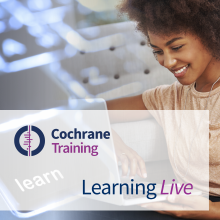
In the absence of head-to-head randomised controlled trials (RCTs), network meta-analysis (NMA) can compare treatment effects across a network of connected RCTs. However, RCT evidence for interventions of interest can be disconnected or provide only highly uncertain estimates for relative effects. Healthcare decision makers, such as the National Institute for Health and Care Excellence in the UK still need to be able to compare treatment effects.
These videos, originally part of the Cochrane Learning Live webinar series, review existing strategies for connecting evidence networks, including the use of non-randomized comparative evidence (NRCE) and the individual patient data (IPD) methods of matching adjusted indirect comparison. In scenarios where NRCE and IPD are not available, the presenter proposes two solutions of last resort that use only aggregate RCT data and possibly single-arm studies. These proposed methods are then tested on an illustrative example and through a simulation study.
The session was aimed at anyone working on, or with an interest in, network meta-analysis.
The webinar was delivered in August 2020 and below you will find the videos from the webinar, together with accompanying slides to download [PDF].
Part 1: Network meta-analysis on disconnected evidence networks: presentation
Part 2: Questions and answers
Presenter Bio
Howard Thom is a Lecturer in health economics and Research Fellow in statistical modelling at the University of Bristol. His main research interests are value of information analysis for adaptive trial designs, structural uncertainty in economic models, and disconnected networks in network meta-analysis. Over the past 10 years he’s been involved in dozens of network meta-analyses, simulated treatment comparisons, and matching adjusted indirect comparisons. These have been across a wide range of diseases, including psychiatry, rheumatology, and cardiology, and in both an academic and commercial setting.
Part 1: Network meta-analysis on disconnected evidence networks: presentation
Part 2: Questions and answers
Additional materials
Download the slides from the webinar [PDF]
